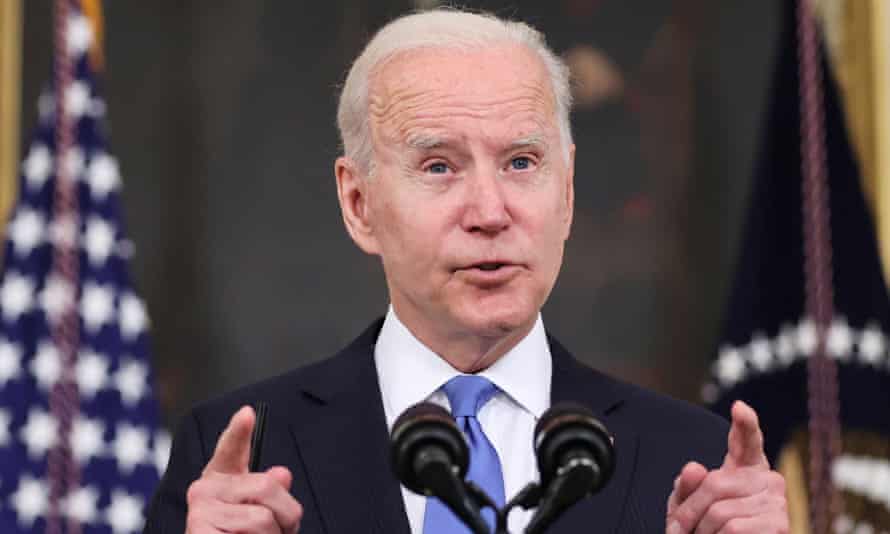Analysis: Joe Biden’s support for idea is vital but it won’t happen without backing of other rich nations

It was a “seismic decision” by Joe Biden, the US president, say campaigners who have fought for the demolition of patent protection on vaccines and drugs for decades. The US administration has amazed supporters and critics alike by throwing its considerable weight behind the pleas of South Africa, India and about 100 developing countries at the World Trade Organization to overturn patents on Covid vaccines in the interests of getting more of them, more cheaply and faster, to huge populations in need.
Patents preserve the profits of the multinational companies that make drugs and vaccines. They make it illegal for up to 20 years for manufacturers of generic medicines to turn out cheap copycat versions. In this pandemic where, as the World Health Organization says, no one is safe until everyone is safe, there is a powerful moral case for ditching them.
But the US has always been home to much of big pharma and a diehard protector of patents, which the industry argues are vital to allow them to recoup the huge and risky investment they make in research and development.
The pressure is now on the UK and Europe, which are also bastions of the pharmaceutical industry. The head of the European Commission, Ursula von der Leyen, said on Thursday the bloc was “ready to discuss” the US-backed proposal, though a German government spokesman said the plan would create “severe complications” for vaccine production.
The talk behind closed doors and on protected phone lines between company bosses and politicians is only to be imagined. Médecins Sans Frontières, one of the most respected voices in this debate because it comes from doctors who risk their lives on the ground in pandemics and emergencies, said: “Countries that continue to oppose the WTO waiver, such as European Union countries, the United Kingdom, Switzerland, Canada, Australia, Norway, Japan, and Brazil must now take action, too, and decide to put people’s health before pharmaceutical profits and waive IP on all Covid-19 medical tools, including vaccines.”
That is notable on two counts. The heat is now on the European countries. And vaccines are not the only issue.
Biden has not just upset but overturned the pharma cart and the apples are rolling all over the ground. The patent issues have been live ones since the Aids epidemic at the end of the 90s. Some of the same campaigners who are cheering Biden now were involved in protests and marches for patents to be scrapped on HIV drugs.
It never happened. The US was vehemently opposed. India’s generics companies were able to make cheap copycat versions thanks to a loophole in the country’s own IP rules. The US refused to buy them for Africa with its aid money, but the pressure forced the companies to lower their prices.
With the US lining up with the low- and middle-income countries at the WTO, the patent wall could finally be breached. The rallying cry is vaccines, for which there is such massive need. One in four people are now vaccinated in the high-income countries, but one in 500 in poor countries are.
But patents themselves are not the only issue. Relatively few factories around the world know how to make copycat versions of vaccines or are able to reach the very high standards for sterility and quality that a vaccine requires. Vaccines are biological. They are not like drugs, which are mostly chemical compounds and can be churned out overnight in Asia’s back streets. That’s why the campaigners want the technological knowhow to be handed over as well. The companies that own the vaccines must help set up factories around the world and train their staff.
And there is another big problem. Even the factories that do exist are struggling to get some of the vital supplies, such as filters, tubes, bags and glass vials. There have been runs on all these things. And the US has been accused of blocking exports to protect its own vaccine production. Even the big companies have been complaining. Novavax said last month it would struggle to meet its EU order because it could not get the sterile bags in which to grow virus cells.
All of this can be overcome. Biden’s administration is perfectly placed to make it happen, but it won’t if Europe and the UK do not come onboard.
The main reason why they will be reluctant and that big pharma will come out with all guns blazing is that the campaigners are already saying it cannot stop at vaccines. Once any patent waiver is agreed, the door is open to more. Expensive drugs such as the monoclonal antibodies that President Trump was given and Gilead’s remdesivir (although the WHO says it does not work well) are obvious examples.
And that may have to be conceded. The argument the US is likely to make is that the pandemic is exceptional. The global need is extreme. All nations must come together to fight it with all the tools at their disposal. Affordable tools. It is hard to argue against that. But watch the UK, Switzerland, Canada, Australia, Norway, Japan and others with powerful pharma friends try.
